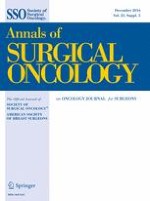Erschienen in:

24.08.2016 | Gastrointestinal Oncology
Usefulness of Surgical Apgar Score on Predicting Survival After Surgery for Gastric Cancer
verfasst von:
Takanobu Yamada, MD, Akira Tsuburaya, MD, PhD, Tsutomu Hayashi, MD, Toru Aoyama, MD, PhD, Hirohito Fujikawa, MD, Junya Shirai, MD, Haruhiko Cho, MD, PhD, Toshio Sasaki, MD, PhD, Yasushi Rino, MD, PhD, Munetaka Masuda, MD, PhD, Takaki Yoshikawa, MD, PhD
Erschienen in:
Annals of Surgical Oncology
|
Sonderheft 5/2016
Einloggen, um Zugang zu erhalten
Abstract
Background
Complete surgical resection is essential for a cure for most gastric cancer. Recently it was reported that surgical Apgar score (SAS) can predict postoperative complication and that postoperative complication is associated with poor long-term survival. The aim of this study is to assess whether SAS can predict overall survival (OS) after surgery for gastric cancer.
Methods
We retrospectively compared clinicopathological characteristics and survival between high and low SAS score groups in patients who underwent gastrectomy for gastric cancer.
Results
Low-scored SAS group (group L) was significantly more common among ASA-PS 2, open approach, total gastrectomy, D2 lymph node dissection, postoperative complication grade 2–4, deep tumor invasion, lymph node metastases, and advanced pathological TNM stage than high-scored SAS group (group H). The 5-year OS of group H and group L were 81.6 and 55.9 %, respectively (p < .001); OS of group L tended to be poorer than that of group H in stage III patients (p = .060) and in stage IV patients (p < .001). In multivariate analysis, pathological stage and SAS were identified as independent predictors for OS.
Conclusions
SAS is useful for predicting survival after surgery for gastric cancer.